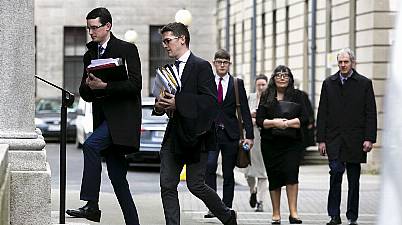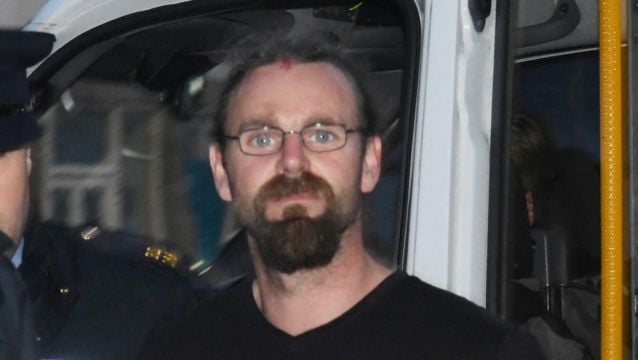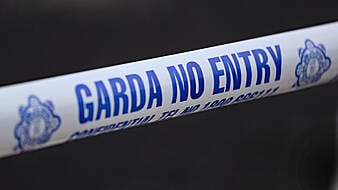Stephen Silver, who is on trial accused of murdering a garda with his own gun, expressed “no regret or sympathy for the deceased” and was "angry" and "self-pitying" during garda interviews, a psychiatrist has told the Central Criminal Court.
Consultant psychiatrist Professor Harry Kennedy said the accused appeared to show “poor social judgement” and engaged in “self dramatising behaviour”.
He said all of this could be explained by Mr Silver’s personality, heightened under the conditions of the stress and strain of his arrest and were not the result of his mental illness.
The psychiatrist told Michael Delaney SC, prosecuting, on Tuesday that Mr Silver had a long history of behaving in a “disruptive manner” requiring his family and members of the public to seek the assistance of the gardaí.
He said Mr Silver had learned from experience that he would not be charged and his surprise at being detained following the fatal shooting of Garda Colm Horkan was understandable because of his “learned impunity”.
Prof Kennedy also told the jury that during garda interviews, Mr Silver showed a “strength of will” and was “not suggestible”.
Mr Silver (46), a motorbike mechanic from Aughavard, Foxford, Co Mayo has pleaded not guilty to the capital murder of Garda Horkan (49) knowing or being reckless whether he was a member of An Garda Siochana acting in accordance with his duty at Castlerea, Co Roscommon on June 17th, 2020.
He has pleaded guilty to manslaughter and the jury have been told the main issue in the trial is Mr Silver's state of mind at the time of the shooting.
Professor Kennedy told Mr Delaney SC that he interviewed Mr Silver three times. Mr Silver told Professor Kennedy that his first psychiatric admission had lasted about three months, and he had been off work for a year after that because of depression.
Mr Silver said his longest period without a psychiatric admission had been between 2010 and 2018.
He said during his time in Dublin with an Australian woman he had “fleeting thoughts” that she was in MI6.
Mr Delaney said the jury had heard Mr Silver describe how during their hotel stay in Dublin he thought the woman he was with might push him out the window and also believed some builders staying across the hall were in the SAS.
He also thought there was a bomb under his van. “Was any of that information provided to you?,” he asked Prof Kennedy who replied: “No he didn’t mention any of that at all.”
Prof Kennedy said Mr Silver then told him he had seen the video of James Coyne’s house being raided, and he decided to visit Mr Coyne.
He said they went to his bike shed, and the accused gave Mr Coyne a motorbike. Mr Silver said: “I was too generous, I couldn’t afford it” and said he “wasn’t well” and “I just felt sorry for him”.
Prof Kennedy said giving the bike away could point to an act of expansiveness and of the person being in a hyper state but said Mr Silver gave a reasonable explanation for his decision, saying he had too many bikes.
Mr Silver went on to recount how they went back to Mr Coyne’s house and drove the bike around the estate with no helmet or lights. He said the two men then headed towards town to get pizza.
Mr Silver said as they were walking he had “a strange feeling in my head” and said he thought he was talking to James Coyne’s dead brother.
Intent
Professor Kennedy said Mr Silver had carried out a purposeful sequence of actions such as taking the gun, standing back, pointing and aiming the gun and choosing to fire at the garda, not in the air. He said this series of purposeful actions showed the capacity to form specific intent.
Prof Kennedy said he asked Mr Silver what he was thinking when the garda was on the ground and the accused told him: “Nothing” and said it was a “gut reaction, no thought was put into it”. Mr Silver added: “I was fearful for my own life”.
The psychiatrist said he asked Mr Silver if he had ever been involved in any other fights and Mr Silver told him he had “a couple of things with guards” in Castlebar when they came to bring him to hospital.
Professor Kennedy said he put it to Mr Silver that he had been annoyed with the guards before he and James Coyne went to get pizza, and he replied: “I was annoyed with them alright. It was going through my head, and it stayed in my head.”
When asked if he was upset about what happened, Mr Silver said “it does upset me” adding “it affects me every day that I shot a man and he’s dead”.
Mr Silver told the psychiatrist that after he was charged, he was transferred to the Central Mental Hospital where he stayed for a period of ten months.
Professor Kennedy said that during his final interview with Mr Silver, the accused told him that on several occasions he had made up his own mind to stop taking his medication.
The psychiatrist said this was a “self-defeating decision” but also a decision anyone can make and this was a decision Stephen Silver made when he was well and was not a product of his illness.
Prof Kennedy said a common feature leading up to Mr Silver’s admissions to hospital was stopping medication and taking intoxicants.
The psychiatrist said during one admission in 2006, gardaí attended the accused’s home, and he had barricaded himself into his bedroom before emerging dressed in leathers and holding a long sword.
He said the account given by gardaí was that Mr Silver was threatening to them before putting down the sword and allowing gardaí to handcuff him. He then went to the station and had tea with the guards.
Professor Kennedy said this episode with the guards led to a “dramatic and threatening gesture”. He said the pattern of behaviour displayed was best explained by personality.
“We all have personality, and we all have patterns of behaviour,” he said adding this incident was an example of “self dramatising” behaviour.
He said in bipolar affective disorder this may be “exaggerated” but it is “fundamentally connected to one’s own personality”.
Prof Kennedy said during his garda interviews, Mr Silver was keenly aware of the correct process of his rights and showed a “strength of will” and was “not suggestible”.
Agitated
Professor Kennedy said in his fifth garda interview Mr Silver becomes “increasingly agitated” but said he did not believe he was showing signs of mania or hypomania.
He said the hostility to gardaí shown by Mr Silver was a “defensive effort” to avoid the evidence that was being put to him.
The expert medical witness said throughout the garda interviews Mr Silver maintained a heightened emotional state and was at times angry and self-pitying. He said the accused expressed no regret or sympathy for the deceased and appeared to show poor social judgement, expecting to be released without charge.
He said all of this could be explained by Mr Silver’s personality, heightened under the conditions of the stress and strain of his arrest.
"Everyone has a personality, everyone’s personality is different. What I'm observing here is there are aspects of Mr Silver’s behaviour which are in keeping with his personality,” he told Mr Delaney.
The psychiatrist said Mr Silver had a long experience of “behaving in a disruptive manner” requiring his family and members of the public to seek the assistance of the gardaí.
Although often taken into custody, Mr Silver had learned from experience that he would not be charged and at most he would be detained in hospital, he added.
His surprise and outrage at being detained was therefore understandable because of his “learned impunity” that there would be no consequences for his actions.
Prof Kennedy said he could find nothing in the interviews to confirm delusions or hallucinations.
He said Mr Silver’s more extreme behaviour of whistling and singing or fixing blinds appears when he is attempting to” drown out” information being put to him.

Professor Kennedy said in the period following his arrest and during his time in custody Mr Silver developed a relapse of his disorder which was not in evidence at the time of the shooting but said Mr Silver may have been in the “early stages” of a relapse.
Under cross-examination, Dominic McGinn, for the defence, said there was nothing to suggest aggression or violence in Mr Silver’s behaviour when he was well and asked Prof Kennedy if it would be fair to say that they were in evidence when Mr Silver was suffering a relapse of his disorder.
“There’s no evidence he behaves like that in normal life,” he added.
Prof Kennedy said these traits were not a feature of bipolar disorder and can only appear if they are aspects of the person’s own personality.







